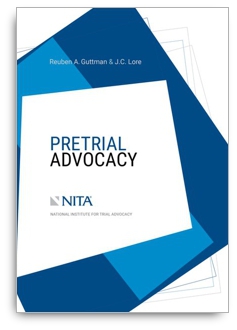Book: New Pretrial Advocacy Book Addresses New Norms in Transformed Field of Litigation
A new book on pretrial advocacy, published this week by the National Institute for Trial Advocacy (NITA) and Wolters Kluwer, takes on a world of litigation that has been radically transformed in recent years by remote proceedings and other practice norms that often deliver resolution long before litigants face off in the courtroom. (Available in print and e-book here.)
In Pretrial Advocacy, authors Reuben A. Guttman and J.C. Lore address the challenges of litigating in a civil justice system that is overburdened yet essential to implementation of the rule of law. Even as nearly 90% of all civil matters never come before a jury, lawyers must nevertheless prepare cases as though they will. Because modern civil litigation is, the authors say, “front loaded,” lawyers are challenged early on in the pretrial process to consider the rules of evidence and civil procedure as they gather information to plead a plausible complaint.
“The pretrial process is laden with unwritten norms. All parties, from litigants to jurists, struggle to provide efficient resolutions while balancing due process,” said Lore, a Distinguished Clinical professor and Director of Trial Advocacy at Rutgers Law School. “We wanted to write something that explains it all.” The strategies and techniques outlined in Pretrial Advocacy put forward responsive new approaches to teaching advocacy in both law school and continuing legal education settings.
In addition to practical tips and insights from some of the nation’s foremost jurists and practitioners, Pretrial Advocacy features a foreword by retired U.S. District Court Judge for the District of Massachusetts and Harvard Law faculty member Nancy Gertner. “Pretrial Advocacy fills an important space for litigators,” Gertner said. “It teaches how to try cases from the moment a client contacts the lawyer through the trial, encouraging lawyers to engage in strategic decisions about pretrial discovery and motion practice. Why depose this witness rather than another? What is the purpose? What are the salient documents—not every single one, not just the few ‘gotcha’ documents, but those that build the narrative.”
Pretrial Advocacy closes with chapter dedicated to public interest litigation. “We thought a chapter on public interest litigation was necessary because there are too many people—from immigrants to victims of race and gender discrimination and whistleblowers—seeking to have their voice heard, and they need competent representation,” said Guttman. Guttman is a founding partner of the Washington, D.C. law firm of Guttman Buschner, PLLC, where he has represented clients in False Claims cases in matters returning more than $6 billion to the United States government.
Guttman and Lore are available to the media to comment on matters in civil litigation and the civil justice system.
 Pretrial Advocacy is the ideal textbook for law school clinics, law school pretrial litigation courses, and practicing lawyers. Both practical and theoretical, it teaches litigation as a process informed by rules and cases, but also by strategic considerations. Its hands-on and accessible text makes it a perfect reference for learning skills and a continuing reference.
Pretrial Advocacy is the ideal textbook for law school clinics, law school pretrial litigation courses, and practicing lawyers. Both practical and theoretical, it teaches litigation as a process informed by rules and cases, but also by strategic considerations. Its hands-on and accessible text makes it a perfect reference for learning skills and a continuing reference.
